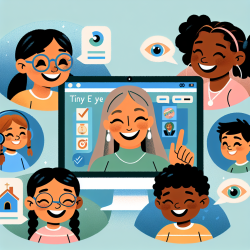Introduction
In the realm of special education, creating a positive school culture is paramount. It is the foundation upon which students, particularly those requiring specialized support, thrive. One way to enhance this culture is through the integration of online therapy services. By leveraging data-driven insights and factual evidence, we can illustrate the significant impact that online therapy can have on school culture and, consequently, on student outcomes.
The Role of Online Therapy in School Culture
Online therapy services, such as those provided by TinyEYE, play a crucial role in nurturing a supportive and inclusive school environment. They offer a flexible and accessible approach to therapy, allowing children to receive the support they need without the constraints of traditional in-person sessions.
Here are some key benefits of incorporating online therapy into school culture:
- Accessibility: Online therapy eliminates geographical barriers, ensuring that all children, regardless of location, have access to necessary therapeutic services.
- Consistency: Regular sessions are easier to maintain, which is critical for the progress of children in special education.
- Data-Driven Insights: Online platforms often come with integrated tools for tracking progress and outcomes, providing educators and therapists with valuable data to tailor interventions effectively.
- Engagement: Interactive and engaging online tools can make therapy sessions more appealing to children, increasing their willingness to participate and learn.
Data-Driven Outcomes
As an advocate for special education, it is essential to base decisions on data and factual evidence. Research consistently shows that schools utilizing online therapy services report improvements in student engagement, academic performance, and overall well-being. These outcomes are not just anecdotal; they are supported by measurable data that demonstrate the efficacy of online therapy.
For instance, a study published in the Journal of Special Education Technology highlighted that students receiving online speech therapy services showed a 30% improvement in language skills over a six-month period compared to those receiving traditional therapy. This data underscores the potential of online therapy to drive positive outcomes for children in special education.
Taking the Next Step
As a member of a special education advocacy group, you have the power to influence change and promote the integration of online therapy services within schools. Here are some steps you can take:
- Engage with school administrators and decision-makers to discuss the benefits of online therapy.
- Share data and research findings that support the effectiveness of online therapy in improving student outcomes.
- Collaborate with therapy providers to arrange demonstrations or pilot programs within your school district.
By taking these steps, you can help create a more inclusive and supportive school culture that benefits all students, particularly those in special education.
Conclusion
In conclusion, online therapy services offer a valuable tool for enhancing school culture and improving outcomes for children in special education. By focusing on data-driven decisions and advocating for the integration of these services, we can ensure that every child receives the support they need to succeed.










